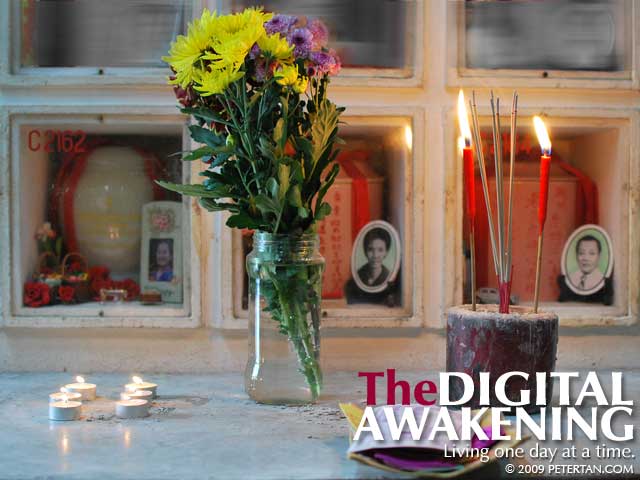
Photo by Wuan.
The gravelly laterite road wound through rambutan and durian trees that provided a welcome shade from the scorching midday sun. This is the path many had taken, by foot, in cars, in a hearse. Many tears had been shed as heavy feet trudged on the sometimes muddied trek to a loved one’s final resting place.
I made that journey once, a long time ago, accompanying my Ah Kong in the hearse that carried the casket he was resting in. First stop after leaving the house where the wake was held was the Church of the Holy Name of Jesus, an imposing structure in rural Balik Pulau, for the funeral Mass. His father, my great grandfather, helped build the church. Many of our relatives worship there, and had their last Mass there, too.
After Mass, the casket was taken on a slow ride down the narrow tarred road, pass a wooden bridge, up the laterite road and on to a small grassy field where the hearse stopped. A simple structure stood on the left, a zinc roof supported by pillars, perhaps to shade mourners when the heavens opened up. Tall rubber trees bordered the field on the far edge and on the right. Drab grey granite tombstones filled the rest of the open space. They looked like dominoes arranged close to one another. My Ah Kong’s freshly dug grave was frontmost.
Mum would visit her father’s grave on All Souls day every year, without fail. I would tag along, not understanding the significance then. Lighted white candles were placed before the tombstone and on the mound. She would then pour some water into a glass jar that we brought and put stalks of chrysanthemums, orchids and carnations – whatever were available from the florist that day.
Wuan and I were in Penang last week to “tiam chek ga” for Mum. “Tiam chek ga” means lighting candles on All Souls’ Day in the Hokkien dialect. Mum’s youngest sister, Cheng Ee, went with us. We had picked her up from her flat somewhere in town. Where white candles are usually used for such occasions, I have decided to use tea light candles instead. They do not leave melted max and burn longer.
We brought along joss sticks, a pair of red candles and some joss paper for Dad, too. He practiced a mix of Buddhism and Taoism when he was alive. For one reason or another, I have never thought of bringing joss sticks and red candles the numerous times I were at the columbarium to pray for Mum although their niches were next to each other.
The columbarium is not accessible. I had to make do with getting Wuan to pray on my behalf while I said my prayers in the car parked just outside. I had instructed Wuan on what to do. On one part, six tea light candles were for Mum; on the other, the joss sticks and red candles were for Dad.
We brought some chrysanthemums too but forgot to bring a jar. The caretaker found one for us one and even filled it up with water to put the flowers in. By the time Wuan and Cheng Ee came out from the columbarium, it had began to drizzle. There was one thing left to do. They walked over to the pagoda-shaped furnace by the perimeter fence to burn the joss paper.
This two-in-one prayer is for the sake of expediency. I have never gone back to Penang during “Cheng Beng” to pay my respects before Dad’s remains since moving to Kuala Lumpur. In fact, I have never visited the columbarium after Dad’s remains were interred there until after Mum passed away when I had to place her remains there as well. May they both rest in peace.

